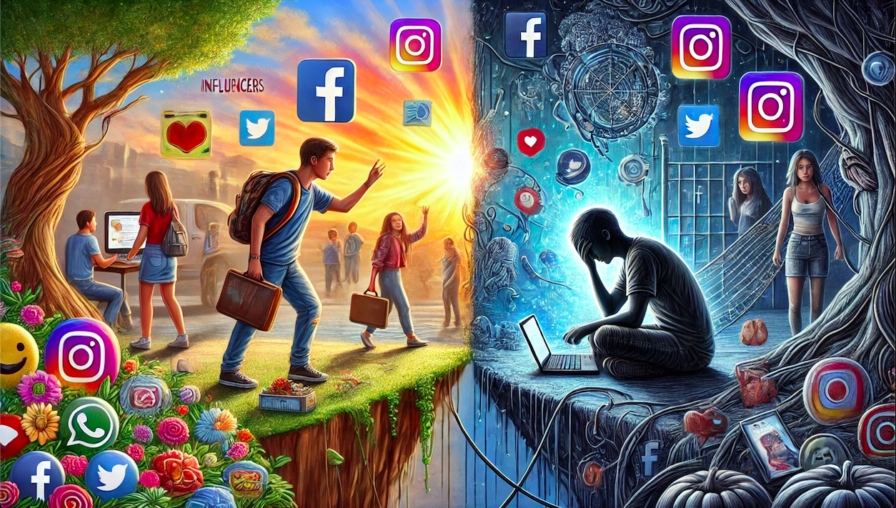In this digital age social influencers have become powerful figures shaping the thoughts, beliefs, and behaviors of young people worldwide. Unlike traditional celebrities, who gained fame through talent and years of experience, influencers are grabbing a hold of the social media platforms like TikTok, YouTube, and Twitter. They create content ranging from lifestyle, fashion, fitness, and entertainment to self-improvement, education, and activism. The name iInfluencer, itself suggests their influence on the world. More specifically, the youth. They have having profound influence over the minds of emerging youth.
Some provide very useful information while some gain popularity overnight. But imagine, watching a girl with a perfect hourglass figure, vlogging on Instagram showing her life. As a girl studying in college, if I perceive her, it creates a negative image in the mind. Some might feel that the body standards depicted are the only way to be seen and noticed. This is Foramz and today we will be discussing the Impact of Influencers on Young Minds.
The rise of influencer culture has sparked debates on its effects—whether it is empowering the youth by providing them with inspiration and knowledge or negatively shaping their perceptions through unrealistic standards, materialism, and mental health challenges.

The human mind, particularly during youth, is highly impressionable. Adolescence and early adulthood are crucial stages of cognitive and emotional development, where individuals seek role models to define their identity and values. In the past, these role models, were often parents, teachers, and historical figures. However, with the rise of social media influencers have taken over as role models for inspiration.
Unlike mainstream celebrities, actors, and stars, influencers seem more relatable. They share daily lives, struggles, and personal achievements, creating a sense of authenticity that resonates deeply. The perceived authenticity fosters rust making youth more reliant on the opinions, habits, and lifestyles of influencers. Whether it is following a particular fashion trend adopting a diet or pursuing a certain career path, young people often base their choices on what they see online. It is bound to happen, what we see all the time influences our thoughts and perception of reality.
The algorithms on social media seem to know exactly how you feel, be sad, depressed, or happy social media pops up the reel which heightens that emotion. The influence of social media influencers on youth is a double-edged sword. On one hand, influencers can be a force for good, inspiring people to develop skills, adopt healthier habits, and become more aware. On the other hand, they can also contribute to toxic mindsets, unrealistic expectations, and psychological distress. It is all how youth perceive it. You might have faced this one moment when you feel amazing about your body but the other moment you see the life of an influencer following, a keto diet or going to a fancy gym and having a fantastic figure. There goes our mind distracted. Our minds started comparing our bodies with the perceived reality of influencers.
The dark side of influencer culture cannot be ignored. One of the most significant issues is the promotion of unrealistic standards—whether it’s beauty, success, or lifestyle. Social media influencers often portray picture-perfect lives, edited to remove flaws and struggles. This creates a false perception of reality, making young people feel inadequate when they compare themselves to these carefully curated images.
Materialism and consumerism are also prevalent in influencer culture. Many influencers are always promoting luxury brands, expensive lifestyles, and unattainable beauty standards, which make the youth believe that happiness is tied to wealth and physical appearance. This makes them suffer from low self-esteem, anxiety, and financial irresponsibility as they try to keep up with the trends of influencers.
Conclusion: The Need for Critical Awareness
Ultimately, the influence of social media influencers is neither entirely good nor entirely bad. The key lies in how we navigate ourselves through this influence. In the next blog, we will discuss how the influencer culture affects the mental health of youth in detail.
Keep Reading Foramz for your daily dose of Moral support.


Leave a Reply